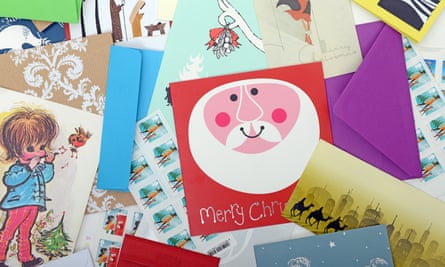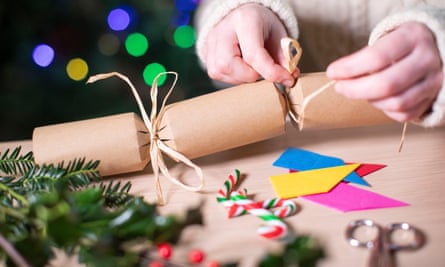You’ve greened your Christmas tree and planned your festive menu so that as little food as possible gets wasted. Now you just need to make sure that other festive paraphernalia doesn’t just add to landfill.
Wrapping paper
One oft-quoted statistic is that each Christmas, as much as 227,000 miles of wrapping paper ends up in UK rubbish bins. Another is that the amount of gift wrap thrown away over the festive period in the UK alone would stretch to the moon.
But the good news is that when it comes to eco-friendly options, there is now plenty of choice. Lots of retailers, from John Lewis to Wilko, say they have made their wrapping paper recyclable. What’s the betting that Boris Johnson will be popping in to Wilko to pick up some of its Peppa Pig Christmas gift wrap (£2 for a 4 metre roll)?
Online you will find specialist companies such as Re-wrapped (re-wrapped.co.uk), which says it only uses 100% recycled unbleached materials and vegan-friendly vegetable inks, and adds that all its products are biodegradable and compostable and can be recycled.
The RSPB got a name-check in Country Life for its recyclable gift wrap options. The nature conservation charity’s Christmas wrapping paper is recyclable, made from Forest Stewardship Council (FSC) certified paper and, this year, from recycled paper printed with water-based inks.
But before you go out and buy new paper, “make sure that all last year’s leftovers and gift bags are being reused,” says a spokesperson for the NetVoucherCodes.co.uk website. Some people will have held on to old wrapping paper or bags so that they can give them another outing later this month.
Alternatively, newspaper and brown paper are easy to recycle, and natural twine is much better than sticky tape. Another option is to use fabric. During the last few years there’s been growing interest in furoshiki, traditional Japanese cloths used to wrap or transport goods. They are eye-catching and reusable, and websites such as Etsy feature stacks of different furoshiki options to suit all budgets. YouTube has video tutorials on fabric gift wrapping.
Recycle Now, the national recycling campaign for England, says some councils will accept wrapping paper in household recycling collection schemes, but others won’t as it is not accepted by some recycled paper mills. So check with your local authority before you put it in the wrong bin.
Wrapping paper is often dyed, laminated or contains non-paper additives such as glitter which can’t be recycled. Meanwhile, some gift wrap is very thin and doesn’t contain enough good-quality fibres for recycling, says Recycle Now. Before attempting to recycle it, remove any sticky tape and decorations.
There seems to be a growing trend for wrapping paper with “biodegradable” glitter, though this is a contentious area. A study published by academics at Anglia Ruskin University in October 2020 found that biodegradable alternatives “are no better for the environment” than traditional glitter, but the company behind Bioglitter, which is used in gift wrap sold by the likes of WH Smith, hit out at the findings and said its product wasn’t used in the study.
 View image in fullscreenMost Christmas cards are paper-based and can be recycled, along with their envelopes. Photograph: Christian Sinibaldi/The Guardian
View image in fullscreenMost Christmas cards are paper-based and can be recycled, along with their envelopes. Photograph: Christian Sinibaldi/The Guardian
Christmas cards
Arguably the greenest option is to go paperless and send e-cards to your loved ones. A number of leading charities including Friends of the Earth and Shelter, will let you pick a design, add your message, donate and send.
Some of the greenest cards you can get are available from specialist players such as ecoLiving (ecoliving.co.uk) and 1 Tree Cards (1treecards.com). In both cases the firm plants a tree for every eco-friendly card sold, plus you get a pack of forget-me-not seed sticks or a flower seed token that you can plant. This week the firms’ websites were selling packs of 10 Christmas cards for £15 and £13.99 respectively.
According to Recycle Now, most Christmas cards are paper-based and can be recycled, along with their envelopes, either in your household collections or at local recycling points. “Any embellishments such as ribbons or glitter cannot be recycled so should be removed first by simply tearing off that section,” it adds.
But before recycling, consider whether you can get any more use out of your cards, advises charity the The Woodland Trust. For example, you could upcycle them into decorations or gift tags for next Christmas.
 View image in fullscreenMaking your own Christmas crackers is one way to be more sustainable. Photograph: Daisy-Daisy/Alamy
View image in fullscreenMaking your own Christmas crackers is one way to be more sustainable. Photograph: Daisy-Daisy/Alamy
Christmas crackers
Traditionally these have been one of the most environmentally-unfriendly festive purchases, with lots of single-use plastic tat destined for landfill and – when the pulling and banging is over – a pile of paper and packaging to deal with.
However, many UK retailers have stopped selling crackers containing plastic toys, ditched the glitter that can make recycling the detritus a challenge, and in some cases even switched to using recycled paper.
At the budget end, Wilko is selling a pack of six crackers for children, each containing a gift, a hat, a snap and a motto, for £3. These are recyclable, with plastic-free content and packaging.
Other offerings include Paperchase’s rather striking Nutcracker-themed crackers, costing £12 for a box of six. Each contains a joke, a hat and a festive trivia card. These boast no plastic contents and are FSC approved.
Meanwhile, if you’d like your guests to get something they really want, whether it’s a sweet treat or something more special, Lakeland is offering a pack of six luxurious-looking “fill your own” crackers for £14.99. You pop your chosen small gift into the cracker, add one of the snaps, hats and jokes included, then fasten with the gold tie. They are made of glitter-free recyclable card.
Another option that’s getting more popular is reusable fabric Christmas crackers, available from sites such as Notonthehighstreet and Etsy.





